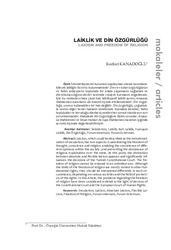Laiklik ve din özgürlüğü
| dc.contributor.author | Kanadoğlu, Korkut | |
| dc.date.accessioned | 2020-03-18T09:13:50Z | |
| dc.date.available | 2020-03-18T09:13:50Z | |
| dc.date.issued | 2013 | |
| dc.identifier.issn | 1304-2408 | en_US |
| dc.identifier.uri | http://hdl.handle.net/10679/6404 | |
| dc.identifier.uri | http://tbbdergisi.barobirlik.org.tr/ | |
| dc.description.abstract | Sekülerleşmenin kurumsal yapılaşması olarak tanımlana- bilecek laikliğin iki yönü bulunmaktadır: Din ve vicdan özgürlüğünün ve farklı anlayışların toplumda bir arada yaşamasını sağlamak ve din istismarcılığının devlet üzerinde vesayet kurmasını engellemek. İşte bu noktada ortaya çıkan katı laiklik-pasif laiklik ayrımı, Anayasa Mahkemesi kararlarını da önemli ölçüde etkilemektedir. Din özgür- lüğü, sınırsız kullanabilen bir hak değildir. Din özgürlüğü, çoğunluk- la sınırını diğer temel hakların kendisinde bulmakla beraber, farklı topluluklar ve koruduğu alanlar açısından her somut olayda ayrı ayrı yorumlanmalıdır. Makalede din özgürlüğüne ilişkin sorunlar, Anaya- sa Mahkemesi ve İnsan Hakları Avrupa Mahkemesi kararları ışığında ayrıntılı biçimde değerlendirilmiştir. | en_US |
| dc.description.abstract | Laicism, which could be described as the instutionali- sation of secularism, has two aspects: Guaranteeing the freedom of thought, conscience and religion, enabling the coexistence of diffe- rent opinions within the society, and preventing the dominance of religious exploitation over the state. At this point, the distinction between absolute and flexible laicism appears and significantly inf- luences the decisions of the Turkish Constitutional Court. The fre- edom of religion cannot be enjoyed in an unlimited way. Although the limits of the freedom of religion are mostly rooted in other fun- damental rights, they should be interpreted differently in each cir- cumstance, depending on various societies and the field of protecti- on of the rights. In this Article, the problems regarding the freedom of religion have been considered in detail in the light of decions of the Constitutional Court and the European Court of Human Rights. | |
| dc.language.iso | tur | en_US |
| dc.publisher | Türkiye Barolar Birliği | en_US |
| dc.relation.ispartof | Türkiye Barolar Birliği Dergisi | |
| dc.rights | openAccess | |
| dc.title | Laiklik ve din özgürlüğü | en_US |
| dc.title.alternative | Laicism and freedom of religion | |
| dc.type | Article | en_US |
| dc.description.version | Publisher version | en_US |
| dc.peerreviewed | yes | en_US |
| dc.publicationstatus | Published | en_US |
| dc.contributor.department | Özyeğin University | |
| dc.contributor.authorID | (ORCID 0000-0002-0499-5856 & YÖK ID 21207) Kanadoğlu, Korkut | |
| dc.contributor.ozuauthor | Kanadoğlu, Korkut | |
| dc.identifier.issue | 109 | en_US |
| dc.identifier.startpage | 353 | en_US |
| dc.identifier.endpage | 384 | en_US |
| dc.subject.keywords | Sekülerizm | en_US |
| dc.subject.keywords | Laiklik | en_US |
| dc.subject.keywords | Katı laiklik | en_US |
| dc.subject.keywords | Yumuşak laiklik | en_US |
| dc.subject.keywords | Din özgürlüğü | en_US |
| dc.subject.keywords | Forum internum | en_US |
| dc.subject.keywords | Forum externum | en_US |
| dc.subject.keywords | Secularism | en_US |
| dc.subject.keywords | Laicism | en_US |
| dc.subject.keywords | Absolute laicism | en_US |
| dc.subject.keywords | Flexible laicism | en_US |
| dc.subject.keywords | Freedom of religion | en_US |
| dc.subject.keywords | Forum internum | en_US |
| dc.subject.keywords | Forum externum | en_US |
| dc.contributor.authorMale | 1 | |
| dc.relation.publicationcategory | Article - National Refereed Journal - Institutional Academic Staff |
Files in this item
This item appears in the following Collection(s)
Share this page



